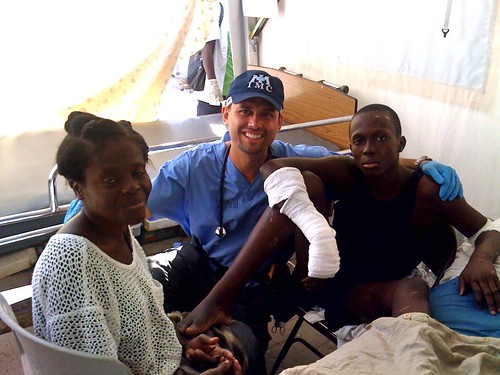I received the following from Anil on Sunday, January 24, 2010 at 23:38 ET. I've split the original email into two posts. I've also made minor spelling and grammar corrections and have tried my best to fill in missing words. I've added hyperlinks where I thought they might help.
From: Anil S. Menon
Sent at 23:38 ET/Haiti Time
The top five rules in a disaster.
1) Smile and Care
"It means more than any treatment you might render." [Stanford Hospital Palliative Care Nurse] Garrett Chan told me this, and I am believing it to be true. The more I do, the more questions I get asked, the more directions I get dragged in, the more important it seems to be there when I'm there. The people that smile the most, that I will remember, and the situation I will always remember positively was my very first patient.
My first patient ever
He was 16, and he had a swollen leg with obvious cellulitis. I met him on day 1, and his 1st through 3rd toes were completely necrotic and hanging off his foot like autumn leaves. I was overwhelmed that day, but I couldn't walk away, even though he was supposed to be someone else's responsibility (by our triage system). Everyday, I stopped, smiled, changed his dressing, and eventually got him to see Dr. Pier [Boutin], who removed those toes, and now see him everyday in the post-op area. Someone said he will probably win an Olympic race. I wouldn't be surprised.
2) Be flexible - Every day is a new day.
On the first day, I was a mostly an intern, seeing a few patients, referring them to the surgeons, and sweating to see everyone that walked through the door. Some of the time I might have been a tech, a nurse, a transporter, or a scribe. On the second day I replaced Bob Norris to run an area, know all the patients, and triage the patients for the surgeons.
On the third day, I spent much of my time taking Bob's job that he just vacated: running the triage pre-op area and doing more administrative work, meeting with
surgeons so they don't step on each others [toes]. A few doctors came, wanted to help, but really only wanted a few specific tasks, things that they found fulfilling (reductions, no nights, of course the minority). A disaster veteran, Dr. Tascone who has made 25 trips to
Africa as part of a reconstruction process, took the night watch.
This leads me to the third point.
3) Keep the broader goal in mind
You came to help in any way, and with that, all other problems are solved.
4) Work until you drop
There was a plastic surgeon by the name of Silver who could barely walk by the end of the day. He was older, but he maximized his effort, and I figured I could do the same.
5) Take care of yourself
I think you can recover physically like Dr. Silver, but it's more difficult to be present emotionally day after day. That's why I write, and that's why I appreciate all the support I have received.
[Note: the second part of this email will be published in a separate post]
--
Anil Menon, MD is a clinical instructor at Stanford School of Medicine focused on surgery and emergency medicine. His research interests are Aerospace Medicine, Emergency Medicine, and Wilderness Medicine. He graduated from Stanford Med in 2006, received a degree in mechanical engineering in 2003 and became a full ER doctor in 2009. He has practiced medicin in combat in Afghanistan and will be practicing aerospace medicine next year at NASA. Menon is a flight surgeon assigned to the 173rd Fighter Wing (F-15s) of the Oregon Air National Guard, and he's part of a team sent to Haiti by Stanford.
This entire series is chronicled under the HaitiDrDispatch tag

